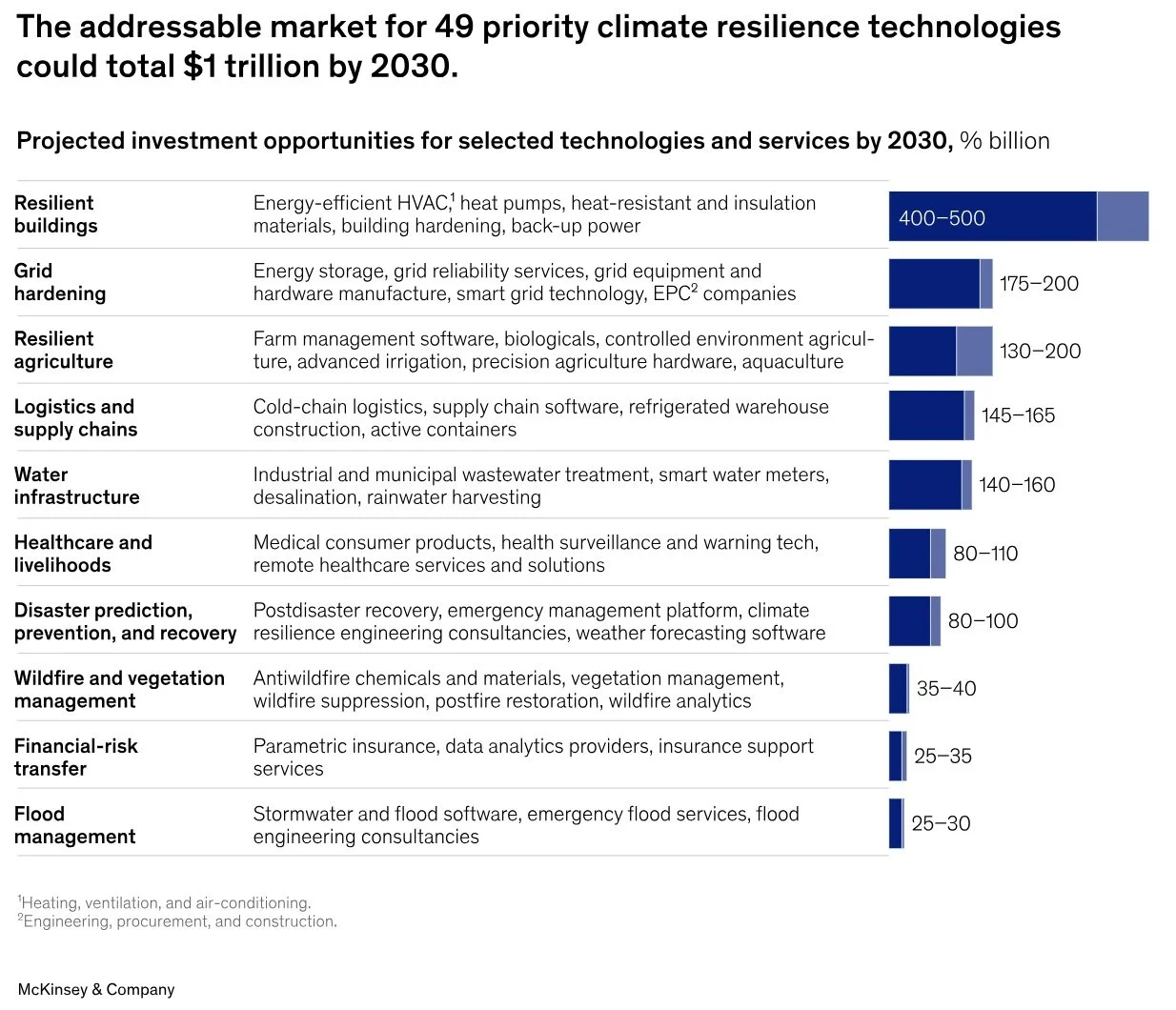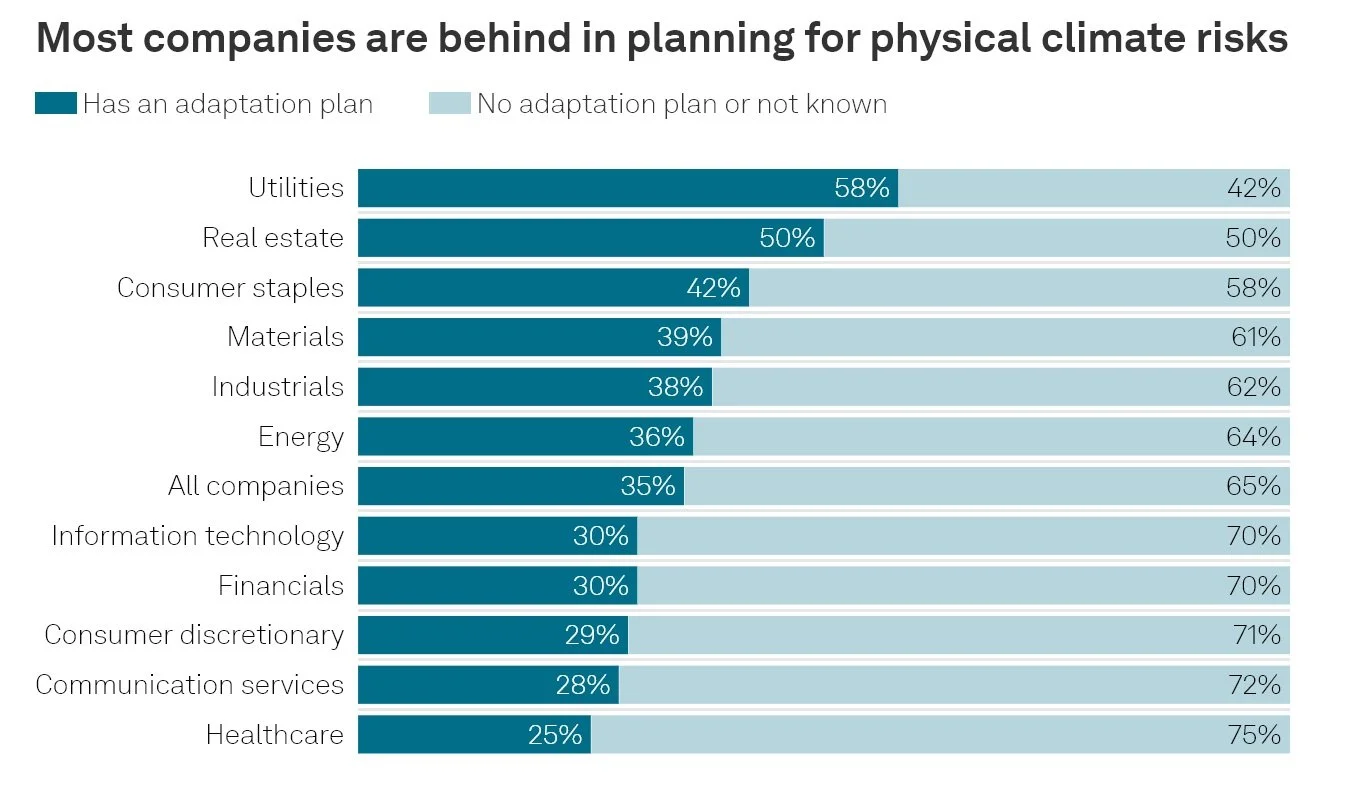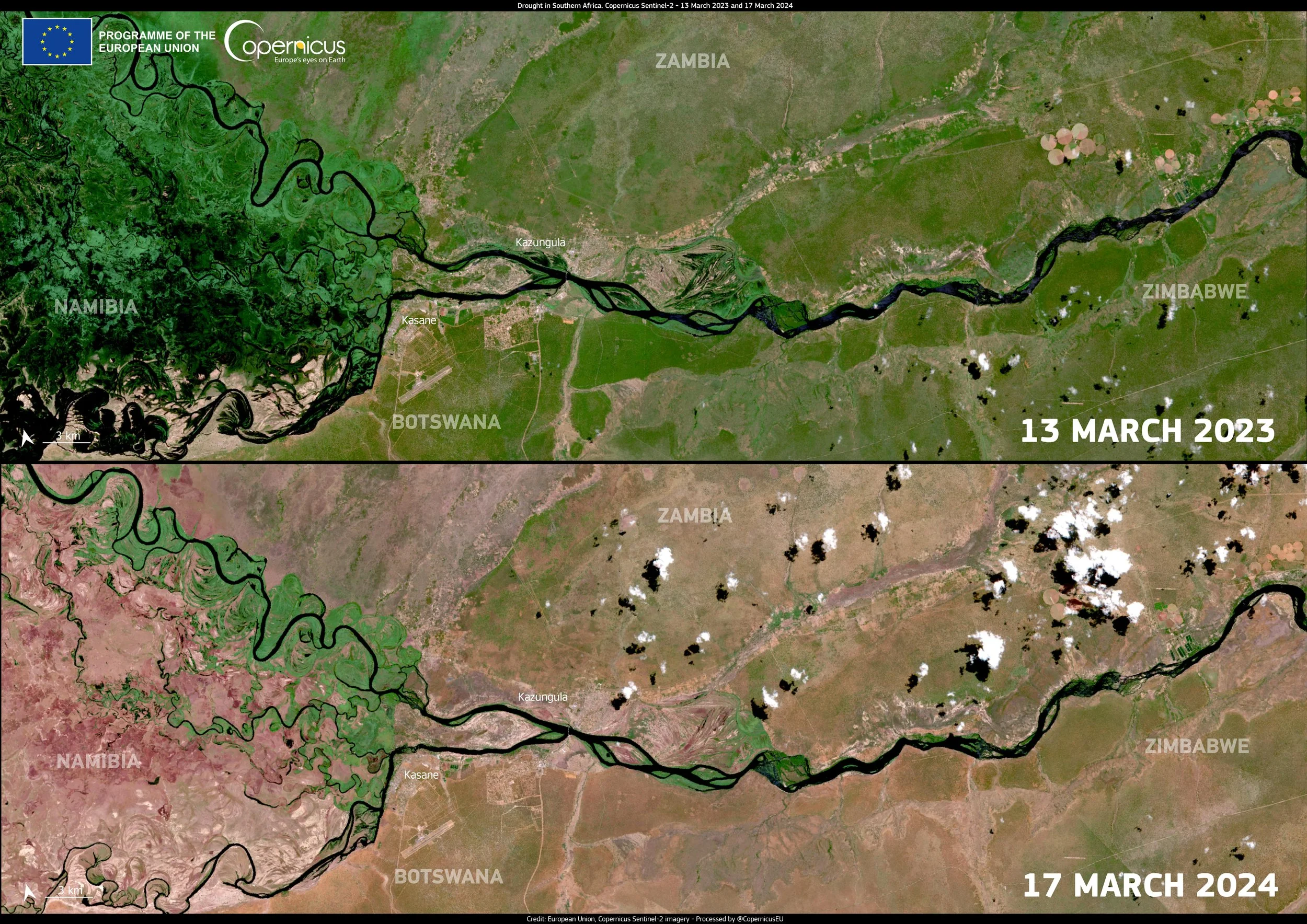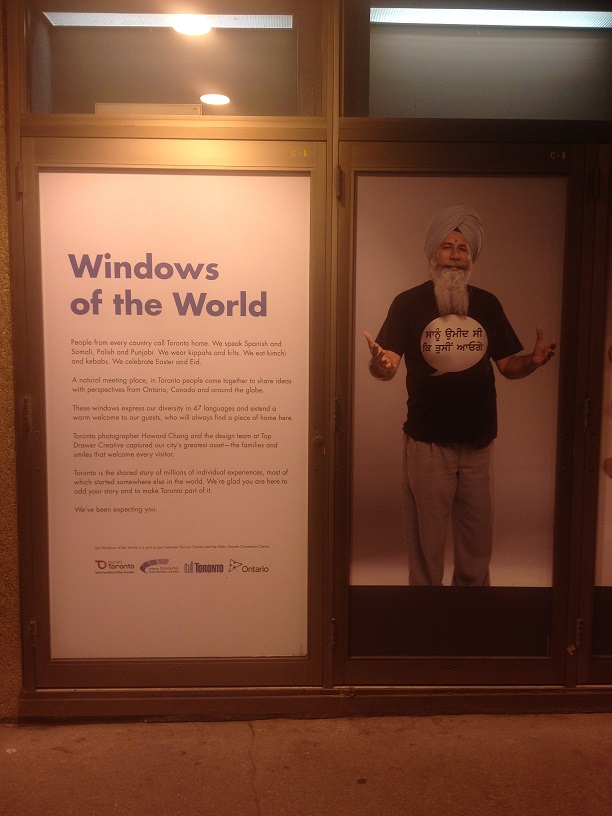Most Leaders Are Still Building For A World That No Longer Exists
The $4.4 trillion gap that will separate tomorrow's winners from everyone else
Your boardroom is making decisions based on assumptions that were no longer true five years ago. Coastal cities are sinking. Floods and fires are redrawing distribution routes. The infrastructure built for a stable planet is cracking under the heat it was never engineered to withstand.
Here's what few in the sustainability conversation want to say out loud: even if every country takes significant action to drastically reduce emissions, we're still facing a couple of decades of disruption. The volatility we're seeing now with our planet. This is as calm as it gets.
Yes, reducing emissions is critical to slowing down the rate of global warming. However, the real question, the one that will determine which organisations dominate the next two decades, is this: who is building systems that can generate value on a planet that has fundamentally changed?
When I first pivoted from looking at the future of digital health to the future of planetary health just over two years ago, I wasn't thinking about opportunity. I was drowning in guilt. The data on extraction, pollution, and emissions since the Industrial Revolution made me feel ashamed for merely existing, for buying imported fruit, heating my home, flying to visit family. Everything I did seemed to be making things worse. All of our human activities contribute to emissions that continue to heat the planet; even hospitals performing life-saving surgeries, clinical trials testing the newest cancer treatments, and nursing homes caring for the oldest members of our society. It took me months to realise that this paralysing shame was itself part of the problem, and that there was another way to look at what's coming.
Immersing myself in planetary health revealed something else: how deeply interconnected our systems are, food, water, energy, health, and finance, mirroring nature's interconnected systems, and how many still view the environment through the narrow lens of climate change. Earth’s systems are being affected by how we live, work, and play, as I came to understand when I worked in digital health; health extends well beyond healthcare itself, and our health is shaped by every government policy, from transport to energy to agriculture. The same applies to our heating planet; it extends well beyond the Ministry of the Environment at the government level or the Sustainability team in a corporation. Our future depends on leaders who can step back and see these connections.
The Trillion-Dollar Opportunity Nobody's Talking About
In September 2025, the Planetary Health Check confirmed what many of us had feared: humanity has now crossed seven of the nine planetary boundaries that keep Earth stable and habitable. Climate change, biosphere integrity, land system change, freshwater use, biogeochemical flows, novel entities (e.g., microplastics), and now, ocean acidification. Only ozone depletion and aerosol loading remain in the safe zone. All seven breached boundaries are worsening.
This isn't about doom. It's about reality. We are already living on a different planet than the one our systems were designed for, and that gap between design and reality is widening every year. This understanding led me to what I call the Resilience Economy, or what investors like BCG are calling 'the next trillion-dollar investment opportunity' in Climate Adaptation & Resilience.
The Resilience Economy encompasses every sector that must redesign for a volatile planet: infrastructure engineered for extreme weather, supply chains built to flex rather than break, agricultural systems that thrive in unpredictable conditions, energy grids that function when the old assumptions fail, insurance products that price for actual risk, and technologies that help communities anticipate what's coming.
The numbers are staggering. McKinsey estimates climate resilience technologies could represent markets worth $600 billion to $1 trillion by 2030.
Climate resilience technology: An inflection point for new investment - McKinsey - September 2025
BCG and Temasek project global adaptation spending hitting $1.3 trillion annually by the same year. GIC calculates that adaptation investment opportunities will grow from $2 trillion today to $9 trillion by 2050. The World Bank calculates that investing in resilient infrastructure delivers $4 in benefits for every $1 invested. Yet UNEP's 2025 Adaptation Gap Report paints a starker picture: developing countries need $310- $ 365 billion annually for adaptation but received only $26 billion in 2023—a gap that disproportionately affects the Global South.
Yet new research from S&P Global reveals that only 35% of companies have any kind of climate adaptation plan, even though climate change could cost major global companies $1.2 trillion annually by the 2050s.
Climate costs are rising but few companies have an adaption plan - S&P Global - March 2025
Healthcare sits at just 25%. IT and financial services: 30%. When 65% of your competitors are flying blind into disruption, the companies that move first don't just survive, they capture market share that never comes back.
The Climate Policy Initiative estimates that global climate finance reached $1.9 trillion in 2023, but we need $6.3 trillion annually by 2030. That $4.4 trillion annual gap isn't a crisis. It's the most significant commercial opportunity any of us will see in our careers.
The Stakeholders Missing from The Room
There's something peculiar about the planetary health conversation that took me months to notice. The genuinely excellent events I’ve attended, which explore topics including food systems, water security, and climate adaptation, feature leading scientists, researchers, and NGOs. Still, three stakeholder groups are almost absent: corporations, investors, and entrepreneurs. These are the very people who play a significant role in shaping future systems.
I’ve discovered so many insights from listening to the planetary health community. When I've tried to share these with businesses, hospitals, banks, defence firms, and more, the response is almost always the same: 'Maneesh, so what? What's the bottom line for us, right here and right now?' At a recent dinner party, I was chatting with another guest about my work. When I mentioned that we need to move toward a regenerative, nature-based economy, they looked at me as if I were speaking a foreign language. Their response? 'OK, that sounds impressive, but what does it mean for me and my firm? What products could I sell in this new economy?' It really hit me that what people desire is clarity: which new markets, where the customers are, and how to solve a meaningful problem and generate value.
It became clear that sharing more reports and scientific papers wasn't going to work. The real message needs to be simpler: if human activities continue to accelerate changes to the planet's natural systems, every organisation, large or small, will be affected, including their ability to grow profits, sales, and market share. That's the bottom line.
Here's the opportunity: governments alone cannot fill a $4.4 trillion annual funding gap. The scale of capital required to build resilient systems exceeds what public finance can deliver. Private investment isn't optional, it's the difference between solutions that remain in pilot phases and solutions that reach the billions of people who need them. This is where I come in: as a bridge between worlds that don't naturally speak to each other, translating scientific urgency into business opportunity, helping business leaders view their adaptation strategies through the lens of planetary health, so they can strengthen their resilience.
Why The Transition Won't Be Linear
That guilt I described. It wasn't an accident. I later discovered that the concept of the 'personal carbon footprint' was popularised by a BP advertising campaign in 2004, designed to shift responsibility from corporations onto individuals. Tobacco companies and plastics producers use the same playbook. Suddenly, I understood why so many people in this space walk around carrying a low-level shame simply for being alive, and why that guilt is paralysing rather than motivating.
I'm not arguing against changing individual behaviour. But there's been an excessive focus on personal carbon footprints that distracts from the more complex work of transforming the systems we all live within. We've built a carbon-based economy over two hundred years. Unravelling that will not be straightforward, no matter how easy an activist might tell you it is.
The backlash is already here. Across the UK and Europe, a 'greenlash' against climate policy is gathering force. The Carnegie Endowment documented how farmers' protests, resistance to low-emission zones, and opposition to heating regulations have forced governments to water down or abandon green policies entirely. The Net-Zero Banking Alliance ceased operations in October 2025, following a series of departures by major financial institutions. BP's CEO admitted the company's optimism about the energy transition had been 'misplaced.'
What went wrong? Political leaders imagined a future where people, profit, and planet existed in harmony, but they designed that future for communities rather than with them. Policy designed in isolation from the people it was meant to serve. In addition, the stories being told about Net Zero have not been compelling enough to get the masses to care, especially if Net Zero policies bring them short-term hardships, like increased costs. The predictable result was resentment, not adoption.
I learned this lesson during my decade in digital health. Brilliant teams poured resources into apps designed to change behaviour, backed by rigorous science, powered by sophisticated algorithms. Most failed. Not because the technology was wrong, but because organisations were designing for patients rather than with patients and their families. It's one of my biggest learnings of the past decade. What shifts behaviour is a story that resonates, something that connects to identity, to meaning, to what someone cares about.
Why I'm Hopeful Anyway
Despite everything I've just written, I've never been more hopeful about the future. Not optimistic that we'll prevent climate change or reverse changes to the Earth’s systems. That ship has sailed. But confident about our capacity to adapt, to build resilience, to create entirely new industries that didn't exist a decade ago.
The global climate adaptation market is projected to grow from $35 billion in 2025 to nearly $105 billion by 2032, representing a compound annual growth rate of nearly 17%. Yet adaptation currently receives less than 10% of global climate investment. Less than $8 billion has been raised for dedicated resilience funds, compared with over $650 billion for decarbonisation. This imbalance won't last.
As the physical impacts become impossible to ignore—Southern Africa's worst drought in living memory, affecting 14 million people and destroying 42% of Zambia's cereal production, Los Angeles wildfires causing over $60 billion in losses, $368 billion in global catastrophe losses last year—the market is waking up.
These Copernicus Sentinel-2 images, acquired in March 2023 (top) and 2024 (bottom), show the changes caused by drought along the borders of Zambia, Botswana, Namibia and Zimbabwe.
Specialised investment firms are launching adaptation funds. More than 3,200 climate-adaptation startups are now operating across Europe, with hubs in London, San Francisco, Singapore, and Berlin.
Yes, some political leaders are retreating from climate commitments, as the Japan Times put it in their year-end review: "In 2025, climate policy was shoved aside even as extreme weather intensified." Yes, the transition will be messy, bumpy, and painful. But companies are discovering that climate resilience isn't a cost centre, it's becoming essential for survival. We don't need every world leader on board. We need enough businesses, investors, and communities to recognise that adapting to a heating planet isn't defeatism. It's pragmatism. And it's where the opportunities of the next decade will be found.
This is why I have decided to pivot my career again. I see a future where resilience becomes the foundation of economic value, where the companies that thrive are the ones that learn to bend rather than break.
That's the future I want to help build. Through my work as a speaker, strategist, and storyteller, I aim to help leaders build future-ready systems that protect people, profit, and the planet.
What's Coming In January 2026
Early in January 2026, I plan to share my thinking on the Resilience Economy in a more direct way, going deeper into emerging markets, breakthrough technologies, and the strategic shifts that will define the next decade of business.
In the first edition, I'll outline the five key themes for 2026 in the Resilience Economy. These relate to where I see the most significant opportunities for leaders who want to move early.
If you're a leader who suspects that business-as-usual has an expiry date, who wants to understand not just the risks ahead but the opportunities they contain, I'd love to have you along for the journey.
For a glimpse into the types of ideas I have for the resilience economy, I’ve just had an article published in Capital Insights - Disruption 2035 (page 135) where I write about we could increase our chances of avoiding wars by investing in food, energy and water security, and why we need a new model for the defence industry by 2035, “Governments spend trillions globally on defence, often viewing it as a necessary evil. But this spending can be redefined. Why must ‘defence’ equal bullets, bunkers, and battleships? The true defence of a nation in 2035 lies in a stable water supply, a resilient food chain, and an independent energy grid.”
The Number That Should Change Your Strategy
$4.4 trillion. Every year. That's the gap between where climate finance is today and where it needs to be by 2030. Someone will fill it. Someone will build the systems, deploy capital, and capture returns.
The only question is whether your organisation will be among them, or whether you'll still be building for a world that no longer exists.



















